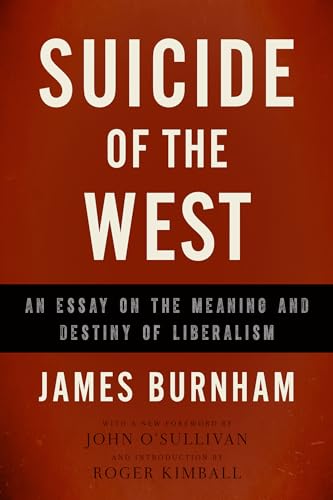Suicide of the West
An Essay on the Meaning and Destiny of Liberalism
James Burnham
BOOK REVIEW

The pages of Suicide of the West: An Essay on the Meaning and Destiny of Liberalism resonate with urgency, beckoning you to confront an unsettling truth: liberalism, that beacon of progress and freedom, now stands on the precipice of collapse. James Burnham, a towering intellectual figure, weaves a narrative that dismantles the comfortable illusions surrounding liberal ideology while prodding us to grapple with the very fate of our society.
Burnham, an acerbic critic and keen observer of political currents, frames his discourse against the backdrop of a world rife with contradictions. His argument is a clarion call, compelling readers to reassess the values we so fiercely uphold. Liberalism, often celebrated as the pinnacle of human achievement, is revealed to be more vulnerable than we ever wished to acknowledge. Through piercing logic and unyielding prose, Burnham compels us to confront a crisis that feels both distant and dreadfully immediate.
The crux of his essay pivots on an unvarnished observation: we have drifted away from the very principles that once fortified our civilization. Community, sacrifice, and tradition have given way to a culture of individualism that prizes self-interest above all. In an era where social media reigns supreme, where echo chambers drown out dissenting voices, Burnham's insights strike with remarkable clarity. He exposes the insidious forces that threaten to poison the roots of liberalism, drawing connections that are both alarming and unavoidable.
As the reader delves deeper into Burnham's thesis, it becomes evident that this is not merely an academic exercise; it's a battle cry for a generation. His words stir something primal within us, igniting indignation and sparking a fervor for change. Discussions around liberalism are not merely intellectual posturing; they have tangible repercussions in the lives of everyday individuals, shaping policies and attitudes that will define our collective future.
The reactions to Burnham's work are as varied as his arguments are profound. Some readers hail him as a prophetic voice, brave enough to challenge the status quo. Others, however, dismiss him as a relic of a bygone era, their commitment to liberal ideals blinding them to the peril he describes. Yet, it is precisely this controversy that underlines the potency of Burnham's delivery. Even the staunchest defenders of liberalism cannot brush aside his compelling narrative without acknowledging the existential dread that bubbles beneath the surface of contemporary discourse.
The historical context in which Burnham writes-the tumult of the 20th century and the rise of authoritarian regimes-further enriches his arguments. It's impossible to ignore the echoes of past cataclysms; those who fail to study history are condemned to repeat it. In illuminating our present through the lens of the past, Burnham challenges you to recognize the cyclical nature of political upheaval and the fragility of the freedoms we hold dear.
While engaging with this essay, you might find your convictions rapidly evolving. Burnham's ability to articulate the complexities of liberalism invites reflection on your own beliefs-forcing you to ask: What sacrifices will we make? What communities will we protect? His analysis nudges you towards a reality check, a wake-up call that transcends ideological boundaries.
Moreover, the rhetorical force of his prose is nothing short of mesmerizing. Burnham doesn't merely invite you to ponder; he demands that you engage deeply and fully with his insights. You might find yourself wrestling with your ideas long after you've turned the final page, contemplating the future trajectory of liberal thought and its implications for a world on the edge of significant change.
For those brave enough to dive into Suicide of the West, the rewards are immense. It's not merely a book; it's a mirror reflecting your own societal aspirations and fears. Burnham's masterful essay disrupts the complacency of an era too comfortable in its certainties, urging you to not only read but to engage, question, and ultimately act.
Don't allow this moment to slip away unnoticed. The future of liberalism, and perhaps the very fabric of society, hangs in the balance. It's time to reclaim the narrative, to fortify the foundations of our beliefs, and to demand that the lights of liberalism shine brightly once more. Engage with Burnham's words, and in doing so, spark a dialogue that may very well shape the contours of our cultural legacy. 🌍✨️
📖 Suicide of the West: An Essay on the Meaning and Destiny of Liberalism
✍ by James Burnham
🧾 400 pages
2014
#suicide #west #essay #meaning #destiny #liberalism #james #burnham #JamesBurnham